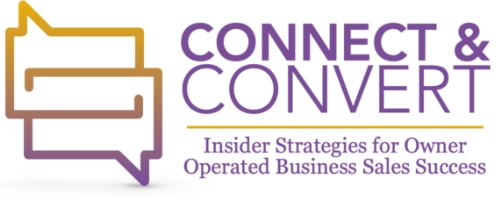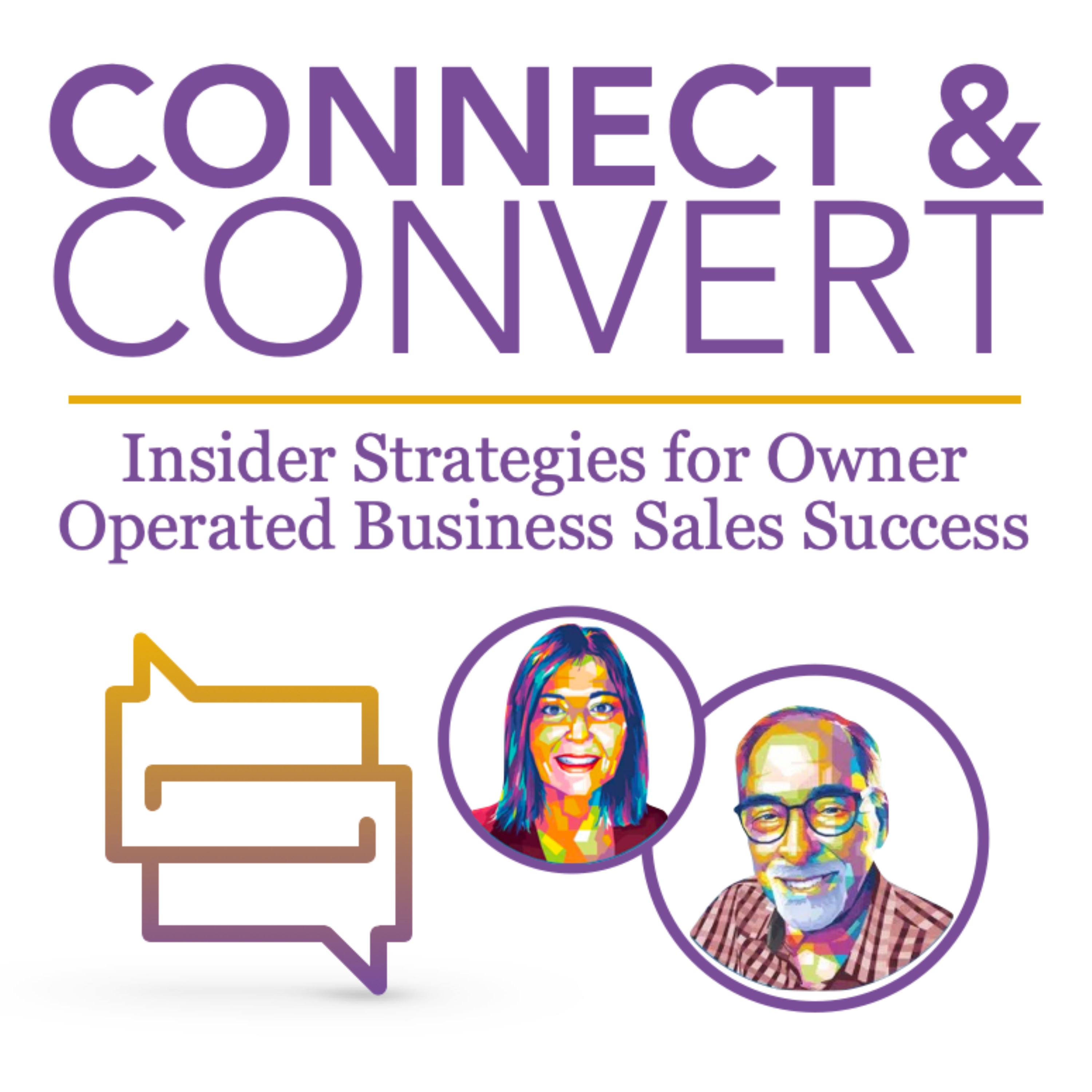Episode 17
Cultivating a Purpose-Driven Sales Team
Dennis discusses research by Dr. Adam Grant showing that focusing salespeople on their purpose and how they help others significantly increased performance. Dennis proposes starting each day by reflecting on why you and your company exist, who you've helped recently, and the impact made to get salespeople focused on purpose and boost results.
Transcript
Hi guys.
Dennis:It's Dennis again.
Dennis:How would you like to learn a sales hack?
Dennis:Yes.
Dennis:A sales hack.
Dennis:That's easy to use.
Dennis:Easy to learn.
Dennis:And can double
Dennis:sales almost instantly.
Dennis:Too good to be true, right?
Dennis:Well, maybe
Dennis:not.
Dennis:Let me introduce someone to you.
Dennis:Maybe you know him, maybe you don't.
Dennis:I have gotten to know him.
Dennis:Through his writings, his speeches, his teachings, his name is Dr.
Dennis:Adam Grant, and Adam hangs out at the Wharton School at the University
Dennis:of Pennsylvania in Philadelphia,
Dennis:and
Dennis:he is a renowned
Dennis:TED Talk speaker.
Dennis:He is a prolific author of too many
Dennis:books to mention.
Dennis:And a renowned social and organizational
Dennis:psychologist, and a lot of his
Dennis:research is done on changing
Dennis:behavior.
Dennis:How does one approach changing a behavior?
Dennis:Well,
Dennis:Grant and colleague in this particular case, a guy named David
Dennis:Hoffman, they've done some major
Dennis:research about behavioral change.
Dennis:One
Dennis:example, a major
Dennis:hospital called them in to address what's a major problem.
Dennis:One out of every 20 hospital patients actually contracts
Dennis:an infection while they're in the hospital, separate from the whole
Dennis:reason they were in the hospital.
Dennis:It causes 100, 000 deaths a year in this country.
Dennis:Can you believe it?
Dennis:And the cost 40 billion.
Dennis:I would say, on many levels, a problem worth solving.
Dennis:Well, Adam knows this.
Dennis:Everybody knows this.
Dennis:Okay.
Dennis:If you live through the pandemic, you know this.
Dennis:The best and most effective way to stop infections is to wash your
Dennis:hands frequently.
Dennis:Now you would think that doctors and nurses and hospitals would get that.
Dennis:I mean, I know they preach it, but guess what?
Dennis:When I did an initial study, the frequency Of handwashing in a
Dennis:hospital situation was surprisingly lower than expected and efforts to
Dennis:improve it hadn't worked very well.
Dennis:So in comes Adam Grant and David
Dennis:Hoffman.
Dennis:So their, scheme was to post signs next, to actually in one hospital 66.
Dennis:washing stations,
Dennis:and they had that gel that you use to wash your hands
Dennis:next to it in the dispensers.
Dennis:So they
Dennis:put, put the,
Dennis:put the signs up for two weeks.
Dennis:They had three different types of signs.
Dennis:Number
Dennis:one sign said, hand hygiene prevents you from catching disease.
Dennis:Okay.
Dennis:Sign number one, one third of the
Dennis:66 got that.
Dennis:Number two, hand
Dennis:hygiene helps prevent
Dennis:patients from catching disease.
Dennis:Hand hygiene prevents patients.
Dennis:from catching disease.
Dennis:That was on another third.
Dennis:And the final third was just a simple sign, gel in,
Dennis:wash out.
Dennis:Gel in, wash out.
Dennis:Okay.
Dennis:So at the end of the two
Dennis:weeks, they went back and weighed the bags of gel soap.
Dennis:And that would be their way
Dennis:to determine usage.
Dennis:So what are the findings?
Dennis:The amount of gel
Dennis:used was
Dennis:the first, the number one, Three signs was pretty much the same as
Dennis:it had been before this experiment, but the amount of gel used when the
Dennis:second sign was used was significantly greater than the other two signs, the
Dennis:sign that said hand hygiene prevents
Dennis:patients from catching diseases.
Dennis:Wow.
Dennis:Shocking.
Dennis:They were shocked.
Dennis:They repeated the experiment
Dennis:next time, and they only had two signs this time.
Dennis:Hand hygiene prevents you from catching
Dennis:the hand hygiene prevents patients from catching diseases just to double check
Dennis:their findings to see what happened.
Dennis:Well, guess what?
Dennis:The purpose based sign, i.
Dennis:e.
Dennis:benefits the patients and washing by 10%.
Dennis:They paid some spies to look into this and sure that it was getting done.
Dennis:And they found 10 percent increase, but way more than that for the
Dennis:doctors, for the physicians.
Dennis:So what's the conclusion?
Dennis:Raising
Dennis:the salience of purpose.
Dennis:Purpose is
Dennis:one of the most potent and most overlooked methods of moving others, of changing.
Dennis:We often believe that we're all
Dennis:motivated by our own self interest.
Dennis:Well, we are.
Dennis:That's not untrue.
Dennis:But there's now a whole stack of research that proves that
Dennis:we all do things for pro
Dennis:social, self transcendent reasons that have a purpose.
Dennis:Okay, so what does all this have to do with
Dennis:sales?
Dennis:Wonderful.
Dennis:Adam Grant made a
Dennis:fortune on the experiment, probably.
Dennis:He writes about it.
Dennis:But what does that have to do with sales?
Dennis:Well, guess what?
Dennis:Grant said, let's take this one step further.
Dennis:Let's see if this
Dennis:research applies in other areas other than in the hospital.
Dennis:So in 2008, he conducted research at a call center.
Dennis:You know, one of those call
Dennis:in centers at a major United States university.
Dennis:Each night, the employees made a ton of outbound calls, and they
Dennis:were calling the university alumni to raise money for the school.
Dennis:Very common, happens, you know, you have an alma mater,
Dennis:I'll bet you get those calls.
Dennis:So, the fundraisers for this experiment were divided into
Dennis:three, they always have three.
Dennis:Group one actually read stories from previous employees
Dennis:explaining what the job of
Dennis:being a hall center person taught them.
Dennis:So it was informed educational
Dennis:group to read stories from university
Dennis:students
Dennis:who had actually received
Dennis:scholarships from this fund of money that they were raising and how that
Dennis:scholarship helped them that they probably wouldn't have been able to
Dennis:go to school without that scholarship.
Dennis:Group three just read articles.
Dennis:They weren't related to the university.
Dennis:They weren't related to fundraising.
Dennis:Just random
Dennis:articles.
Dennis:Okay.
Dennis:So they began
Dennis:their shifts for about
Dennis:a two week
Dennis:period and read these stories for about five
Dennis:minutes before their shift.
Dennis:They weren't allowed to tell
Dennis:anybody that they had read these articles.
Dennis:Okay, so a couple weeks later, Dr.
Dennis:Grant, he checked sales results.
Dennis:Well, group one and group three, they raised the same amount
Dennis:they had been raising as before.
Dennis:Group two, The purpose group, the group that read stories about
Dennis:alumni who had received scholarships and how it benefited them.
Dennis:They went crazy
Dennis:double in that two week period.
Dennis:They
Dennis:doubled
Dennis:the number of pledges and they doubled the
Dennis:amount of money raised based on the baseline they had established before that.
Dennis:So what's
Dennis:the how does that happen?
Dennis:What's the lessons learned?
Dennis:What can we sales managers and sales people learn from them?
Dennis:A five minute reading exercise, double sales production.
Dennis:The stories,
Dennis:the work personal, it's meaningful and purposeful when they had a, why, a purpose
Dennis:behind their fundraising, all of a sudden.
Dennis:They did a better job.
Dennis:They had more conviction, more belief.
Dennis:So how do we make our sales more purposeful?
Dennis:Okay.
Dennis:How does the use of
Dennis:our product and service improve somebody's life or improve a business?
Dennis:You know, that's that's a key question, isn't it?
Dennis:How often do we think about that?
Dennis:How often
Dennis:do we start our day like reviewing
Dennis:testimonials or success stories or how much money we save a business or how many
Dennis:obstacles we help overcome our purpose?
Dennis:So here's my proposal.
Dennis:I proposed all of this, a daily sales accelerator.
Dennis:I just made that up.
Dennis:I don't know where it came from, but here's what it is.
Dennis:Let's start every day with purpose refresher.
Dennis:What's a purpose refresher.
Dennis:Why is our business here?
Dennis:Why am I here as a salesperson, a sales manager or a business owner?
Dennis:Who have we helped pick out
Dennis:maybe a half dozen people
Dennis:we've helped in the last couple of weeks.
Dennis:And specifically, how did we help them?
Dennis:What metrics, what
Dennis:measurable
Dennis:results that they have because able to help them solve a problem and what
Dennis:difference have we made for them?
Dennis:How did it make them feel?
Dennis:Let's put the emotional part in too, because that's important.
Dennis:The daily sales accelerator start every day.
Dennis:If Adam Grant's research holds out.
Dennis:Your sales should soar.
Dennis:Tell me about it next time in our next episode.
Dennis:Coming soon.
Dennis:It's Dennis.
Dennis:Connect & Convert.

